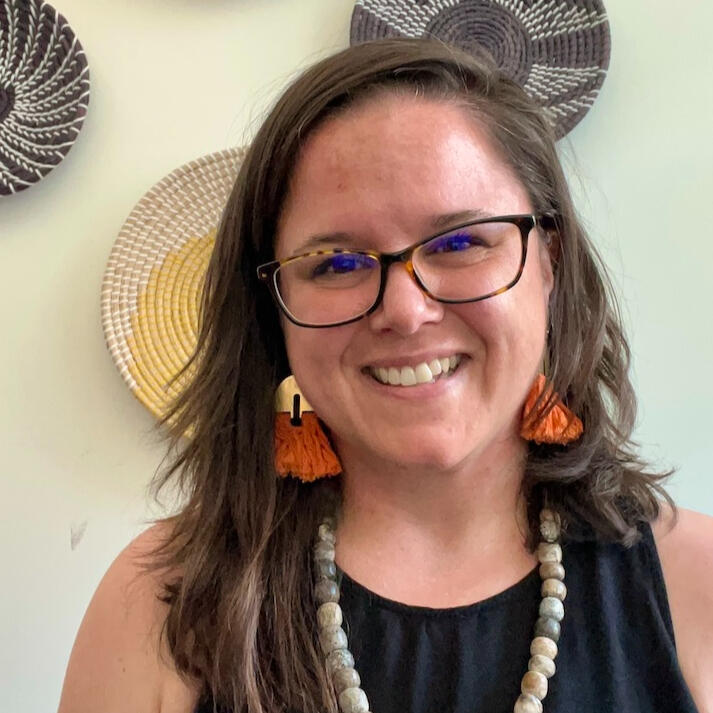Hi! I'm Nicole.


I'm a licensed social worker practicing clinical psychotherapy in Baltimore, Maryland. Welcome to my little corner of the internet!

FAQs About My Practice
How do I find the right therapist?
Get clear on what you want out of therapy: what symptoms do you want to reduce? What strengths do you want to strengthen? What do you struggle to accept and love about yourself?Then find some therapists and interview us. Most of us offer free 15-minute consultation calls for this reason. Ask your therapists how they do their work and how they address the symptoms you have.If a therapist feels like the right vibe, do an intake with them and get a better sense for how they work.If you're not feeling it, you are allowed to say, "I'm going to go with someone else," and then find a better fit. A good therapist will appreciate this honesty and never make you feel badly about it.
What kinds of clients do you work with?
I typically see adults between the ages of around 19 to 45 who are often on queer and/or neurodivergent spectrums.
What symptoms do you treat?
I primarily work with folks experiencing or diagnosed with anxiety, depression, trauma, bipolar, OCD, ADHD, and autism. I also work with folks experiencing major life transitions or crossroads, grief, existential crisis, and spiritual awakenings.
Do you accept insurance?
Yes, I currently accept BCBS, Carefirst, and CIGNA. I'm in the process of being paneled with United as well.

Do you offer telehealth?
I have limited availability for telehealth and primarily see clients in-person. There are a few reasons for this:1 - It helps clients to be more accountable and less distracted. It is difficult to focus on the session when notifications are popping up, or the dog is barking, or the internet connection is shaky.2 - Somatic and parts work are more effective if we are in the room together. This allows me to monitor non-verbal messages the body is sending and to tap more easily into resonance (or how the client's experience is showing up in my own body/energy field). It can also be challenging to guide mindfulness or do parts work with a glitchy internet connection.3 - It lets clients keep their therapy separated from their home. Sometimes it improves a client's ability to express themselves if they get to leave it at my office after the session.All of this being said, telehealth is also the only option for some folks, and I accommodate this by offering limited telehealth slots.
If I can't use my insurance and want to work with you, what would the cost be?
I charge $175 per 60-minute session.
What am I expected to do in therapy?
First, figure out how open to change you are. My specialties work best with folks who are open and ready to make changes, knowing that those changes may be triggering, challenging, and require persistence.Think of me as a co-conspirator in improving your life. I am not the authority on you, and I am not going to make decisions for you. I can help guide you to clarity in what you want your life to look like, but you are the only one who can make changes. Therapy rarely works in just the 60-minute sessions we'll have: it also requires practicing what we talk about when you're not in my office.
What experience do you have addressing racism and other supremacist ideologies in how you provide therapy?
In my practice, it is 100% okay to talk about supremacist structures (like patriarchy, capitalism, imperialism, etc), including the ways that Western psychology can replicate colonialism. I have done both professional and personal work in learning about systems of power and oppression, and do not experience guilt or aversion when speaking about whiteness or the ways that whiteness affects literally everything around us.We cannot actually heal if we are not aware of the impact these systems of violence have on our psyches, both individually and collectively. This is a primary part of my work because I genuinely believe that when we learn to truly love and accept ourselves, supremacy cannot land inside us. I believe that has a ripple effect out into the world and universe around us that ultimately will lead us all to liberation from those structures.I also believe in subverting these structures by understanding them well enough to use that structure's own methods against it.

What is your opinion on mental health medications?
You are always in charge of your body and what you put in it. That being said, I will make recommendations if I think meds could be helpful. I want to make sure clients have accurate information about them and are not making choices about meds based on stigma, shame, or conspiracy theories.I see psych meds in a different way than some other practitioners: for me, meds are one tool in an ever-growing toolbox of methods we can use to improve our quality of life.Psych meds very rarely "fix" mental health, but they often can take the edge off of symptoms that are getting in the way of learning and practicing other skills in the toolbox.Psych meds do not have to be forever, and if they are forever, it is no different to me than the fact that I have to wear glasses to clarify my vision. I do not believe in suffering needlessly, and often meds can help us suffer less while we learn other ways of being.I have been taking psych meds for many years, and while it hasn't always been easy, I'm able to be who I am today in part because of them.
Can you prescribe medication?
I cannot, but I am happy to work with you in finding a provider you feel good about. I recommend psychiatric nurse practitioners and am happy to talk to your provider either with you or on your behalf if you feel that would be supportive.It is also true that most psych meds are prescribed by a primary care physicians, and if you like/trust your PCP, this is great. However, it can be helpful to find a provider who is psychiatrically-trained.

Philosophy & Methods
What we treat in therapy is Western civilization.Our first attachment trauma was being cut off from the land. Then, from community and shared traditions of meaning-making, then from extended family, and finally, from ourselves.Overwhelmed with guilt, shame, and fear, we have lost sight of our own spirits. When we don't love and accept ourselves, we are easier to control, wear out, and exploit. When we learn to love and accept ourselves, we liberate ourselves and the collective.This is why I practice therapy.And while I incorporate elements of Western psychology into my practice, I do so with the awareness that Western psychology aims to "treat disorders" without being accountable to how Western society actually causes a lot of those "disorders."When we are disconnected from the land, from a community, from a healthy extended family, and from a shared sense of meaning-making and ritual, and then thrown into a bright, sharp world moving at hyperspeed and vying to profit off of every moment of our attention... how could we not become anxious? How could we not become depressed?Which isn't to say mental illness isn't real. What I mean is that pathologizing a reasonable response to unreasonable conditions is inherently gaslighting, and as a social worker, it's my job to help clients understand the pressures of their environment, and where they can take back power over their own lives.We are being called to focus. We are being called to resist the distraction of despair and hopelessness.The world is not lost, and neither are we.

Modalities
Like many therapists, I use an eclectic mix of treatment methods, but have developed a general system that works for me and most of my clients. It includes:Mindfulness: the practice of becoming aware of the present moment, which leads to being able to intentionally direct and redirect our attention. The ability to direct our attention is, to me, one of the biggest keys to having the life we want.Somatics: the practice of becoming aware of the body's messages, which it delivers through sensations and states. When we fail to listen to our bodies, our bodies make it harder and harder to ignore.Parts work: for a great primer on this, read No Bad Parts, by Richard Schwartz. This framework posits that we are not one singular entity, but comprised of many parts with different jobs. The parts we feel the most ashamed of are almost always actually trying to protect us, and from this lens we can clear decades of shame, guilt, and fear.Cognitive Behavioral Therapy: this modality shows the connections between our thoughts, feelings, and actions. It slows us down so that we can notice the subconscious stories we tell ourselves before acting. It also helps us notice cognitive distortions, or errors in thinking, that contribute to painful patterns.Dialectical Behavioral Therapy: DBT is great for learning to regulate overwhelming emotions, and for practicing "radical acceptance."Grief work: in the US, we are just about allergic to grief, loss, and death. The process of real grieving is a transformative one, much more than just sadness or pain, and is the primary way our spirits evolve and grow. Grieving is a skill, and without this skill, much of our suppressed grief coagulates into depression, addiction, and other ailments - which we then blame ourselves for.Biology: we are a social primate species, and while we think very highly of our hyper-intellectualized society, we are still just animals. As pack animals, we are wired to be in strongly bonded groups, or we whither.Attachment theory: because we are wired for connection with others, we experience life-altering trauma when we are rejected, even in small ways, from our birth families.Spirituality: this doesn't have to mean religion or a belief in any deity. It refers instead to the human need for meaning-making, especially after difficult life experiences. It asks us to release the idea that we're separate. It challenges the idea that intellectual thought is the highest form of knowledge, when it actually pales in comparison to the wisdom of the heart, spirit, and body.Animism: while not a therapeutic modality, animism is the belief that all things - all things - contain a spirit and therefore the ability to be in relationship with. Animism acknowledges the land as a living organism and that we are not a "part" of nature, but rather nature looking back at Herself.And many more!

Contact
If you think we'd be a good match, you can see if I'm accepting new clients and contact me by visiting my Psychology Today profile:Psychology Today
© 2024
The content on this site cannot be used as a substitute for medical or psychiatric care. By using this site, you agree to this policy.